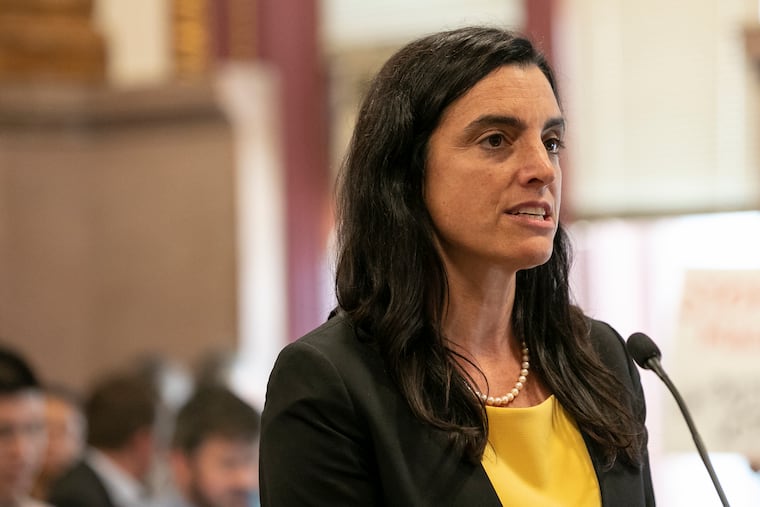Philly employees got paid millions for work the city couldn’t verify was done, watchdog says
Controller Rebecca Rhynhart is calling on Mayor Jim Kenney’s administration to refrain from launching new information technology projects until the city better understands what went wrong with the long-troubled $47 million OnePhilly program.

Philadelphia municipal employees were paid at least $8.4 million last year for hours the city could not verify they had worked at the time, thanks to flaws in its new payroll system that are still not fully resolved, the city controller’s office has found.
In a report released Wednesday, Controller Rebecca Rhynhart called on Mayor Jim Kenney’s administration to halt new information-technology projects until the city better understands what went wrong with the $47 million OnePhilly program.
“When you have a project that is this broke and $40 million was spent on this, the city needs to pause and say, ‘We need to change and improve the way that the city manages IT projects,' so that this doesn’t happen again,” said Rhynhart, an elected official who serves as the city’s financial watchdog.
Rhynhart pointed to the administration’s plan for a new finance software system, for which it has projected spending $132 million across future budgets.
The Kenney administration said that many of the issues identified in Rhynhart’s report, which examines a period ending in June 2019, have since been fixed and that such problems shouldn‘t be unexpected in the first 18 months of a project as vast and complex as OnePhilly.
“The OnePhilly team has made tremendous strides in the past six months in resolving many of the issues that the Controller notes, and which the team itself first identified,” Kenney spokesperson Mike Dunn said.
The city is working to identify and recoup all overpayments made during implementation of the system, he said.
Dunn added that the city already had decided to delay the launch date of the planned finance system project. “The Controller is aware of that decision, so we are perplexed that she is publicly calling on us to do what we have, in fact, already done,” he said.
Launched in 2014, OnePhilly was originally envisioned as a $14.8 million project that by July 2015 would have replaced and combined in a single platform the city’s antiquated systems for timekeeping, payroll, pensions, benefits, and other human resources functions.
Problems with OnePhilly peaked after the March 2019 rollout of the payroll component, which led to complaints from hundreds of employees about incorrect paychecks, tax withholdings, and vacation accruals.
The report looked at eight agencies, including the Police, Streets, and Human Services Departments, and examined the 2019 stretch from March 18 to June 30.
During that time, the city paid employees for about 300,000 hours of work it could not verify by the time paychecks went out, resulting in the $8.4 million in payments that were still unverified as of November. Instead, it paid them using an “assumed time” system based on workers’ normal schedules and relied on the employees and their managers to go back and make adjustments.
The city said it used the “assumed time” system because it was important to ensure workers were paid on time.
“After thoughtful discussion, management agreed to running an Assumed Time program in the event that Departments are unable to update, review and approve time captured for the period,” the Finance Department’s Mervisa Johnson wrote in a letter to Rhynhart. “Timekeepers go back in retro-effective time periods, perform necessary follow-ups, and update assumed time.”
Before her 2017 election, Rhynhart served as chief administrative officer for one year in the Kenney administration and sat on the steering committee for OnePhilly.
“It was a very frustrating and flawed process. It was something that I did speak up often internally about,” Rhynhart said. “I was well aware that there were issues.”
Uncertainty caused by the rocky rollout means the city’s financial statements for last year may be inaccurate, Rhynhart’s report said. The potential scale of those inaccuracies did not rise to the level of having a “material impact” on those statements.
Municipal union leaders say the system has improved, and fewer employees are raising concerns. But not all the problems have gone away. Two city workers who are not authorized to speak to the media reached out to The Inquirer in recent weeks about underpayments caused by OnePhilly.
Some departments are still using their old payroll systems as well as OnePhilly, the report found, creating byzantine processes in a system meant to streamline city functions.
About 1,200 sanitation workers, for instance, have their hours reported by clerks who log them on paper time sheets that are manually entered into the Streets Department’s legacy timekeeping system, only to then be printed out and manually reentered into OnePhilly.